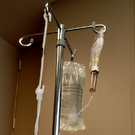
A recent study found that fatigue in multiple myeloma patients is associated with sleep and mood disturbances, reduced abilities to complete simple physical activities, and elevated levels of physical pain.
The study also finds, however, that pain is not as directly linked to fatigue as sleep, the ability to carry out physical activity, and, especially, mood disturbances.
Instead, pain's impact on fatigue may be indirect, through its influence on sleep, mood, or overall physical condition.
Based on their findings, the study authors conclude that physicians need to work harder with patients to control the forces that lead …
Read the full story »

The results from a clinical trial, called the ZMAX trial, suggest that administering Zometa intravenously over a longer period does not increase the drug’s safety compared to shorter infusion times.
Dr. James Berenson, from Berenson Oncology and lead author of the study, stated in email correspondence with The Myeloma Beacon that he hopes these study results will reassure patients that a 15-minute infusion time is safe. Ultimately, the study authors suggested that infusion duration should be based on individual patient …
Read the full story »

Spanish researchers recently published long-term follow-up results confirming that a complete response following stem cell transplantation in multiple myeloma patients increases overall and progression-free survival compared to a very good or partial response.
Treatment with high-dose chemotherapy followed by stem cell transplantation is a standard therapeutic approach for younger, newly diagnosed multiple myeloma patients. There has been some debate among researchers, however, as to whether the quality of response following transplantation can predict patient outcome.
In 2000, the same group …
Read the full story »

Results of a recent study indicate that a history of smoking, the use of the bisphosphonate Aredia, and five genetic variations may put multiple myeloma patients at an increased risk of developing osteonecrosis of the jaw, a rare but serious side effect of bisphosphonate treatment. Several of the genes the study authors identified are involved in bone formation, osteoporosis, and wound healing.
The study authors noted that if their findings can be confirmed in larger studies, they could be used …
Read the full story »

High-dose melphalan continues to be the gold standard regimen for multiple myeloma patients prior to autologous stem cell therapy, according to a recent review of research investigating alternative preparative treatments before stem cell transplantation.
The authors of the review pointed out, however, that current research on variations of this regimen may provide improved transplantation response rates for myeloma patients in the future.
High-dose chemotherapy prior to stem cell transplantation, often called a preparative or conditioning regimen, is administered with the …
Read the full story »

The use of mitoxantrone and melphalan prior to stem cell transplantation in multiple myeloma patients results in favorable survival rates and manageable side effects, according to the results of a Phase 2 clinical trial.
Although the results of the study are encouraging and confirm the results of previous trials, Dr. Anne Beaven, from Duke University Medical Center and lead author of the study, noted that the trial was conducted before the introduction of novel agents into routine clinical practice.
“Until …
Read the full story »

According to a recent study, the bisphosphonate Aredia reduces skeletal-related events, such as bone lesions and bone fractures, in patients with smoldering multiple myeloma; however, it does not prevent disease progression to symptomatic myeloma.
According to the study authors, these findings are consistent with the findings of previous studies that had shorter follow-up times.
Bone disease is frequently associated with multiple myeloma and can cause bone pain and fractures (see related Beacon news). While the symptoms of bone disease …
Read the full story »

